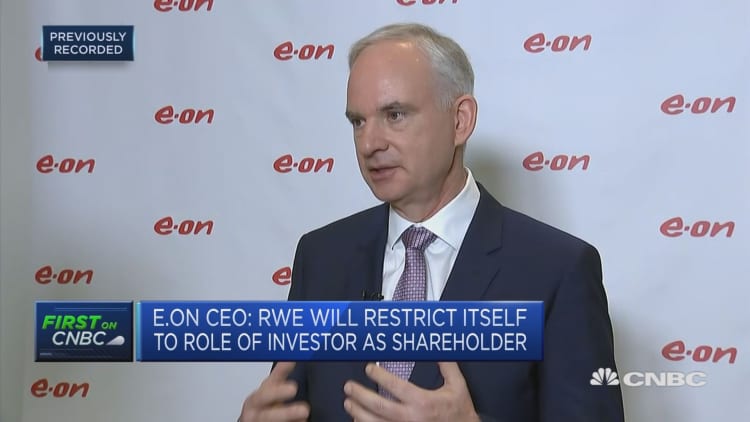
The major asset swap between two German energy powerhouses is a European solution rather than a German one, the CEO of E.ON said Tuesday.
The deal between RWE and E.ON has lifted European stocks this week, as the two behemoths restructured their firms to adjust to the current political climate. Speaking to CNBC on Tuesday, E.ON CEO Johannes Teyssen was keen to stress that the deal would, in his eyes, be in the interests of Europe as a whole.
"We are on eye-to-eye level with big European competitors in all countries across Europe, and we don't strive to be a national champion," he said. "We got a lot of support from politicians and unionists and others across Europe and other markets," he added. "Reducing this deal to a 'German deal' is just missing the point. This is a European deal, of European companies, in the interests of European customers and European employees."
Under the terms of the deal, which was announced on Sunday and has been agreed in principle, RWE will sell its 76.8 percent stake in its green energy spin-off Innogy to E.ON. In turn, RWE will take on the renewables businesses of both E.ON and Innogy. E.ON will be left with the retail assets and will also become Europe's largest operator of electricity grids.
On Monday, E.ON said that it expected as many as 5,000 job cuts and as much as 800 million euros ($990.6 million) in synergies as part of the asset swap, according to Reuters.
"Longer term, I'm very certain that we (will) create thousands and thousands of jobs across Europe, because we will be really driving the industry forward, shaping the industry in the best interest of consumers and thus creating better jobs," Teyssen said.
The deal comes within the context of Germany's energy transition. The country is looking to increase its use of sources such as wind and solar while at the same time moving away from nuclear power. In 2016, renewables made up 29 percent of gross electricity generation in the country, with wind power, biomass and solar photovoltaics leading the way.
Teyssen was bullish about E.ON's role in this shift. While the business would not build big wind or solar farms in the future, it would look to be a part of the energy transition.
"We are the enabler of the energy transformation, the so called Energiewende in Germany, by allowing the local grids to inhale more and more renewables," he said. "I'm quite certain it will grow over the next years, I don't have a precise number, but the limitation will not come from us."
Shares of Innogy were around 0.4 percent lower Tuesday, while E.ON was more than 4 percent higher.




